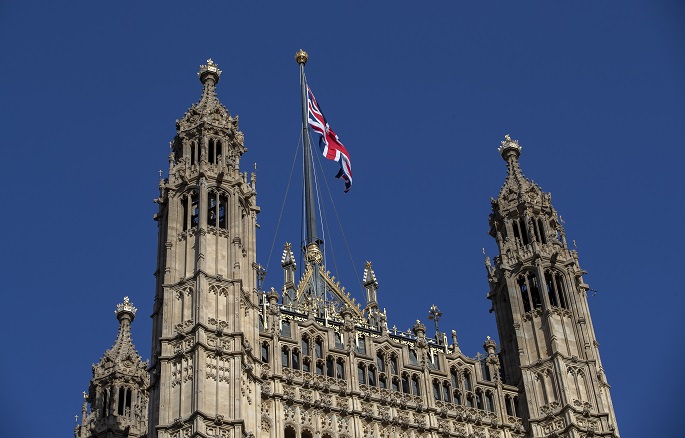UK publishes controversial Brexit bill amid growing anger from Brussels
Published : 10 Sep 2020, 00:27
The British government on Wednesday published a controversial bill which overrides elements of the Brexit deal with Brussels, despite a senior minister explicitly acknowledging that the plan would "break international law," reported Xinhua.
The UK Internal Markets Bill is intended to ensure Northern Ireland can continue to enjoy unfettered access to markets in the rest of Britain.
The bill was published after Britain brushed aside warnings from the European Union (EU) that breaching the treaty would prevent any trade deal being struck.
London's move came as the Britain-EU post-Brexit trade talks entered its second day here.
Britain ended its EU membership on Jan. 31 but is still following EU rules during the transition period until Dec. 31 to enable a permanent future trade deal to be reached. During this period, Britain would have to pay into EU funds but have no say in laws imposed by Brussels.
The British chief Brexit negotiator David Frost said Sunday that his government is unafraid to walk away from the ongoing talks with the EU in London if the regional bloc does not compromise on major issues, including fisheries and state aid rules.
The bill gives ministers the power to decide themselves, rather than in agreement with Europe, about checks on goods as well as on state aid between Northern Ireland and Great Britain.
It also says that the provisions in the bill "must be introduced notwithstanding any relevant international or domestic law", meaning that this legislation must be regarded first.
"The government has now published the new legislation which has intensified further anger in Westminster, Brussels and the international community," said the London-based Evening Standard newspaper.
GROWING BACKLASH
Northern Ireland Secretary Brandon Lewis told MPs on Tuesday that the legislation would breach international law in a "very specific and limited way."
The prime minister is facing a growing Tory backlash over the plans. Tobias Ellwood, chairman of the Commons Defence Committee, said that if the British government went through with the changes to the agreement, which secured Britain's departure from the EU in January, it would "lose the moral high ground."
Meanwhile, the European Commission has called for urgent talks with Britain.
European Commission President Ursula von der Leyen said she was "very concerned about announcements from the British government on its intentions to breach the Withdrawal Agreement."
"This would break international law and undermines trust. Pacta sunt servanda = the foundation of prosperous future relations," she tweeted.
For his part, President of the European Council Charles Michel said: "The Withdrawal agreement was concluded and ratified by both sides, it has to be applied in full."
"Breaking international law is not acceptable and does not create the confidence we need to build our future relationship," he said.
RESPONSES FROM BOTH SIDES
Downing Street has been seeking to justify the bill, saying the Brexit deal was agreed "at pace in the most challenging possible political circumstances."
"The Withdrawal Agreement and the Northern Ireland Protocol aren't like any other treaty," the prime minister's official spokesman said.
"It was agreed at pace in the most challenging possible political circumstances to deliver on a clear political decision by the British people with the clear overriding purpose of protecting the special circumstances of Northern Ireland," the spokesman said.
"It contains ambiguities and in key areas there is a lack of clarity," the spokesman said. "It was written on the assumption that subsequent agreements to clarify these aspects could be reached between us and the EU on the details and that may yet be possible."
Meanwhile, the British government also denied the UK Internal Market Bill is a power grab.
"Absolutely not. What the devolved administrations will enjoy is a power surge when the transition period ends in December, " said the prime minister's spokesman.
"There will be no change to the powers the devolved administrations already have and the vast majority of powers with devolved competencies returning from Brussels will go straight to Holyrood, Stormont and Cardiff Bay," he said.
"Where powers are coming back to the UK Government this is to protect the economy," he added.
Speaking in the British parliament on Wednesday, Johnson defended the legislation, saying it provided a "legal safety net" to protect against "extreme or irrational interpretations" of the Northern Ireland provisions of the agreement which could lead to the creation of "a border down the Irish Sea."
Following the publication of the plans, the opposition Labour Party said it is looking at "potential amendments" to the bill amid "serious concerns," a spokesman for its leader Keir Starmer said.
"There are obviously serious concerns about the contents of the Bill, the implications on devolution and the implications on the Northern Ireland Protocol," he said.
Meanwhile, Scotland's First Minister Nicola Sturgeon tweeted: "In the General Election it was, according to the PM 'oven ready' -- now, when they want to jettison it in breach of international law, it was 'signed in a rush'... They are trashing the UK's international reputation."


